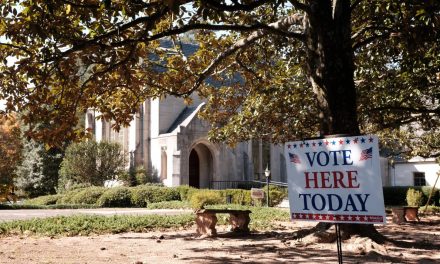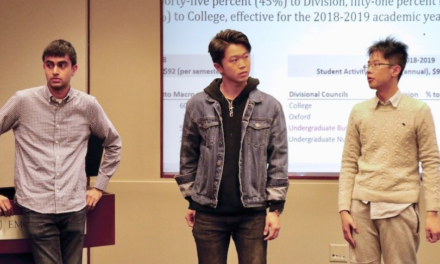“[My classmates] would shake my hand and then they would wipe it,” said Mauricio Perez, an undocumented immigrant from Mexico.
The reason for their disgust: “Because you are not from here.”
Perez, a panelist for “The Dream After DACA: A Conversation with Freedom University” event Sept. 28, explained that that situation was just one of several examples of racial discrimination undocumented immigrants face in the United States, especially after President Donald J. Trump’s administration announced last month that it planned to rescind the Obama-era Deferred Action for Childhood Arrivals (DACA) program. DACA offered a temporary immigration benefit to people who were brought to the country illegally as children.
Three undocumented Freedom University (FU) students, including Perez, discussed discrimination and other hardships at the event hosted by Emory’s chapter of Lambda Sigma Upsilon in White Hall. FU Executive Director Laura Emiko Soltis (12G) said that the purpose of the event was to put a face to the undocumented youth pursuing higher education. More than 15 students and community members attended the event.
Panelist Aitana Regalada immigrated from Ecuador to Georgia more than 16 years ago. When she applied to colleges, Regalada said that she had to identify as an international student and could not receive government-backed scholarships. When her high school friends inquired about not getting a driver’s license or a job, Regalada said that she avoided the subject of her undocumented status.
Such discrimination can occur through systemic policies or implicitly biased attitudes, the speakers said.
In the past, FU has openly criticized and protested Emory University for failing to take a stronger position on protecting undocumented students. On Friday, Soltis said during the event that students and University admissions officers must push University administrators and the Georgia Board of Regents to change legislation to give undocumented students the same rights as other students.
“People in power literally recycle the same types of oppression and [hope] that people don’t notice,” Soltis said. “I think it is important … that we are constantly developing relationships of solidarity [with undocumented immigrants].”
Although students who have DACA status can legally drive, the program does not absolve undocumented immigrants’ fear of deportation, Perez said.
“[DACA] does not do a lot. … If I get pulled over for something, the fear is still there that I can get sent back to a place where I don’t know,” said Perez, who has not returned to Mexico since he arrived in the U.S.
FU provides free college preparation classes and application and scholarship assistance to undocumented immigrants, according to its website.
Georgia banned undocumented students from paying in-state tuition in 2010. The Board of Regents prohibits certain public universities, such as Georgia Institute of Technology and the University of Georgia, from enrolling undocumented students. Emory University accepts applications from undocumented students with or without DACA status, and meets 100 percent of their demonstrated financial need, according to the admissions website.
Aleia Ringel (17Ox, 19C) said she was disappointed that she saw no Caucasian faces in the crowd.
“I thought [the discussion] was important, and while it was very powerful, I feel that it is a little disappointing to see so few students that were not directly affected by this legislation and policy here,” Ringel said.
Another attendee, Rochinelle Dongmo (19C), said that ending DACA would be cruel.
“I think it’s ridiculous because they are not doing anything wrong,” Dongmo said. “They contribute to the economy, and to many of them the U.S has been their home for their entire life.”
Varun Gupta (20C) is studying political science and philosophy. He seeks discomfort by shadowing people in different professions, such as campus security, a sous chef and bar manager. Apart from the Wheel, you can catch him playing ultimate frisbee or recounting a crazy travel experience from one of 21 different countries that he has visited.





